If AirDrop is not working on iPhone, the problem is usually due to the sending/receiving devices not being properly setup to transfer/receive files using AirDrop.
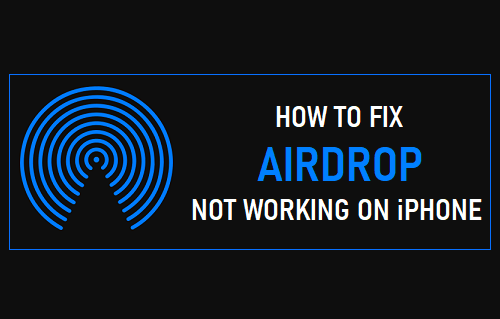
AirDrop Not Working on iPhone
The AirDrop feature on iPhone allows you to wirelessly transfer Files, Photos and Videos from iPhone to any other iPhone or Mac, located within a reasonable distance.
While the AirDrop feature on iPhone works flawlessly most of the times, it is also known to run into problems due to incorrect AirDrop settings, network related problems and other reasons.
In certain cases, the AirDrop Icon appears greyed Out and becomes unresponsive. If this is the case, you need to refer to this guide: How to Fix AirDrop Greyed Out on iPhone and Missing on Mac.
If the AirDrop icon is not greyed out and AirDrop is not working, you should be able to fix the problem using the following steps.
1. Check Device Compatibility
In order to transfer and recieve files using AirDrop, the sending device needs to be an iPhone 5 or later and receiving device needs to be an AirDrop compatible device (iPhone 5 or later, iPod 5th Generation).
If you are transferring files from iPhone to Mac using AirDrop, the MacBook needs to be 2012 or later device, running OS X Yosemite or later version of macOS.
2. Enable Bluetooth
In addition to WiFi or Cellular Network, AirDrop makes use of Bluetooth to locate nearby devices. Hence, make sure that Bluetooth is enabled on both sending and receiving devices.
1. Go to Settings > Bluetooth.
2. On the next screen, make sure Bluetooth is toggled ON.
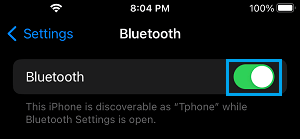
After Enabling Bluetooth, you should be able to transfer files using AirDrop.
3. Make Both Devices Discoverable
In order to transfer files using AirDrop, both the sending and receiving devices need to be made discoverable.
1. Go to Settings > General > AirDrop.
2. On the next screen, make sure Receiving OFF is not selected on both devices.
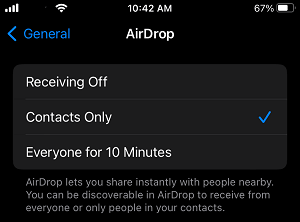
Note: If you select “Contacts Only”, both sending and receiving devices need to be signed into iCloud.
4. Allow AirDrop from Everyone
If AirDrop is still not working, select the Everyone option and see if this helps in fixing the problem.
1. Go to Settings > General > AirDrop.
2. On the next screen, select Everyone for 10 Minutes option.
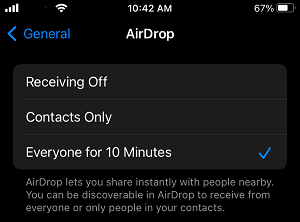
5. Turn OFF Do Not Disturb Mode
You won’t be able to transfer files using AirDrop, if the receiving device is placed in Do Not Disturb or Driving Mode.
1. Go to Settings > Focus > Do Not Disturb > select your Schedule.
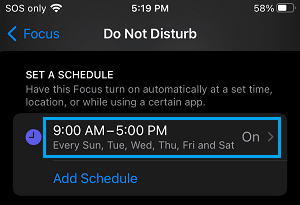
2. On the next screen, move the toggle next to Do Not Disturb to OFF Position.
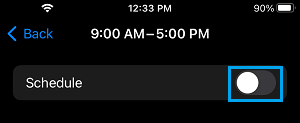
After disabling DND Mode, you should be able to transfer files using AirDrop.
6. Disable Personal Hotspot
AirDrop does not work if personal Hotspot is enabled on your device.
1. Go to Settings > Cellular > Personal Hotspot.
2. Disable Personal Hotspot by moving the toggle to OFF position.
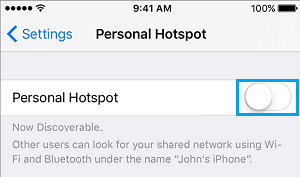
7. Enable/Disable AirPlane Mode
Enabling and Disabling Airplane mode helps in resetting Bluetooth, WiFi and Cellular Networks.
1. Open Settings on your iPhone.
2. On the Settings screen, move the toggle next to Airplane Mode to ON position.
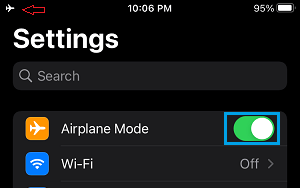
3. Wait for 30 seconds and disable Airplane Mode by moving the toggle to OFF position.
Check the Receiving Device
If you are still unable to get AirDrop working, make sure that the other device that you are transferring or receiving AirDrop data from is properly setup to use AirDrop.
If you are trying to AirDrop from iPhone to Mac, refer to this guide: How to Fix AirDrop Not Working on Mac.